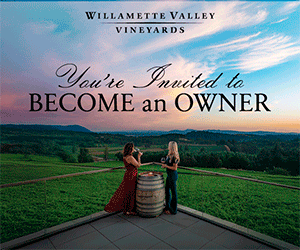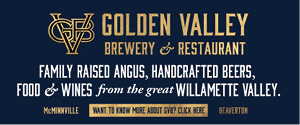Green is the New Blue
For many Oregon cheesemakers, sustainability goes far beyond the latest buzzword. It is at the heart of their business model and a guiding principle in each decision they make.
Issues related to sustainability such as farming in harmony with nature, ethical treatment of animals and an abiding concern for the long-term prosperity of the business and its employees resonate deeply with Oregon consumers, giving cheesemakers who practice sustainable principles more than just a good feeling at the end of the day; they also have an edge when marketing their products.
Sustainable food production is an ongoing process of refining and improving practices in harmony with a core set of beliefs. Three exemplary creameries instituting sustainable practices are at various stages in the business lifecycle, from the very new to the well established.
Terry and Laurie Carlson of Fairview Farm Dairy in Dallas, licensed this past spring to sell their line of raw milk aged goat cheeses, are among Oregon’s newest additions to the cheesemaking scene. Their six-acre farm is located between the Coast Range and the Willamette River.
From the beginning, the Carlson’s approach to farming incorporated rotational grazing, as animals are moved from pasture to pasture to enjoy fresh forage year-round. They are supplemented with organic hay and locally grown grains and other tasty treats such as blackberry brambles and sunflower seeds.
The farm is USDA Transitional Organic, meaning they are in the process of being certified—a time-consuming and costly process. They are also the first Oregon dairy with certification by the Washington, D.C.-based Animal Welfare Institute. The organization certifies family farms (not industrial models) based on strict guidelines for animal health and environmental sustainability practices.
Pholia Farm, located about 10 miles outside of Rogue River in Southern Oregon, is just about as sustainable as you can get. This off-the-grid microcreamery was founded in 2005 by Gianaclis and Vern Caldwell and their daughters, Phoebe and Amelia, on 23 acres of family land. They began making cheese in 2006. The farm, creamery and family home are powered by a solar photovoltaic system and a micro-hydro turbine using a seasonal creek.
The Caldwell’s recently completed the long-anticipated excavation of an aging cave at the base of a nearby mountain. They are currently working on setting up the interior, which, when completed, will triple their current aging space. Having a natural cave environment is wonderful for cheese but is especially important considering their limited power supplies.
The farm currently produces about 100 pounds of raw milk cheeses a month made from their herd of Nigerian Dwarf goats. Does are browsed on daily walks (weather permitting) and supplemented with limited amounts of organic grain, seeds and kelp with the goal of producing the ideal cheesemaking milk, rich in protein, butterfat and solids.
Anticipating their expanded production capacity, Gianaclis has been working hard to selectively breed the does for increased milk production and higher yields so that herd size does not have to be increased. One of the mottos of Pholia Farm: “If we can’t remember the doe’s name, we have too many goats!”
Rogue Creamery, founded in 1935 in Central Point in Southern Oregon, is now in its third generation of leadership. Co-owners David Gremmels and Cary Bryant have been at the helm for seven years and sustainability has been at the core of their mission since they acquired the creamery.
In 2007, the Creamery received a certification from Food Alliance, a Portland based non-profit that provides independent third-party verification of sustainable agricultural and facility management practices.
In the last few months, Rogue Creamery forged a partnership with Noonan Farms, a Klamath Falls-based organic farm and dairy. This new relationship reflects not only the ideal of creating a local, community-based business network but also a shared vision for what’s possible in the creation of sustainable artisan food production.
Farm owner Mike Noonan began producing hay and grain using organic methods in the ’90s. Soon after, the farm was certified organic and began to expand to include vegetables, including a highly successful potato operation. Noonan has been a visionary in creating wetland environments on his property to encourage biodiversity and natural fertilization from migratory birds.
Recently, the farm added a herd of 70 Jersey and Holstein crossbreeds to the mix, completing a sustainable ecosystem in which composted cow manure naturally fertilizes the rest of the operation rather than trucking in organic fertilizer. With the addition of the dairy cows came an abundance of great, organic milk.
Connecting with the Rogue Creamery happened almost effortlessly when a mutual friend introduced Noonan and Gremmels. An instant affinity in business and agricultural philosophy was clear and in short order, Noonan milk has become the single source for the latest Rogue Creamery cheeses, organic TouVelle, a great melting and snacking cheese named after a local park, and Caveman Blue, a natural rind blue cheese that is earthy and uniquely delicious with a fudge-like consistency.
The focus on creating a long-term strategy that supports not just great cheese, but also protects and preserves our natural and human resources is proving to be a key element in the thriving cheese scene playing out throughout the state. Supporting cheesemakers who “walk the walk” is easy—look for their fantastic products at local retailers, including Steve’s Cheese, Elephants and New Seasons. ◊
Christine Hyatt is a Cheese Educator and food writer. She currently serves as the Vice President of the American Cheese Society and welcomes cheesy questions at christine@cheese-chick.com .












